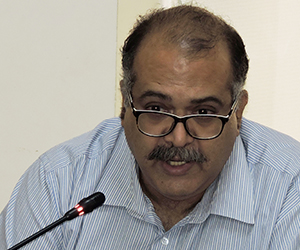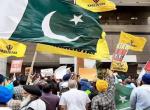More than 12 years after the most audacious and outrageous act of terrorism against India – the attack on the Indian Parliament – one of the prime accused in the case, Afzal Guru, was finally executed after he had exhausted all available legal options. Even though there is a lot to be said against the long delay in carrying out of the death sentence in such a high profile and politically sensitive case, delay which needlessly provides ammunition to the legions of India-baiters and India-haters within the country and without to question the verdict and demand relief for a convicted terrorist, the fact that the government gathered the resolve to finally carry out the sentence needs to be welcomed.
Questions of timing are inevitable in the highly surcharged political climate that exists in the country. Perhaps if the government had sent Afzal Guru to the gallows earlier, it would have been accused of showing unseemly haste. Having delayed the execution so long, it is now being accused of trying to derive political benefit and indulge in damage control to recoup its falling political capital. Clearly, politics cannot be completely divorced in a case of this nature. Apart from legal and procedural obstacles that need to be overcome (including the reluctance of some President’s to reject a mercy petition and of some Home Minister to push forward with the case because of a moral opposition to the death penalty), the government also has to keep an eye on the political fallout and law and order implications of such a sensitive case. For instance, in 2010 and 2011 the streets of cities in the Kashmir Valley were restive and executing Guru at that time would tantamount to pouring fuel into fire. Before that there were state elections and then the Amarnath agitation. Seen in this light, the timing of the execution makes sense and carping about it is only that.
This is not to deny that there could have been other political motivations for carrying out the sentence at this time. For instance, one proposition is that the ruling Congress party has been trying to refurbish it anti-terror credentials and steal the thunder of the opposition BJP which has been accusing the government of being soft on terror. Another proposition is that the government was trying to dilute the damage done by the utterly senseless remarks of the Home Minister on ‘Hindu Terror’ and ‘terror training camps run by the BJP and RSS’. If true, then it would signal a dangerous level of desperation in the Congress government to recover lost political ground. On the other hand, it is entirely possible that government was only demonstrating its resolve in the fight against terror and will now hold the feet of opposition parties to fire on other high profile terrorists who are awaiting death sentence.
Frankly speaking, all political parties have been guilty to some extent of being soft on visiting retribution on convicted terrorists. Take for instance the BJP which has been clamouring for Afzal Guru’s execution for so long. When it comes to carrying out the death sentence on Balwant Singh Rajaona, the murderer of the former Punjab Chief Minister Beant Singh, the BJP very conveniently sides with its ally Akali Dal which is trying to win a reprieve for this unrepentant terrorist. This is so even though the BJP holds the fate of the Punjab government in its hands and could easily pressure the Akali Dal to let Rajaona suffer the consequences of his crime. The Congress too adopts a deafening silence on the issue of executing the LTTE men sentenced in the assassination of former Prime Minister Rajiv Gandhi simply because of the reservations of its ally DMK. The BJP too is keeping quiet because its potential ally AIADMK is opposing the execution. Similar is the case of the BJP and Congress when it comes to the execution of Devinder Singh Bhullar who was responsible for a series of bomb attacks in Delhi.
The point simply is that political parties end up playing into the hands of fringe groups which support these terrorists. By pandering to these groups, the politicians effectively shoot themselves in the foot because on the one hand they embolden these extremists and give respectability, legitimacy and credibility to the noise which they make, and on the other hand undermine the justice system and law and order machinery in the country. Worse, while this sort of politics does nothing to change the anti-national positions that these fringe groups take and bring them into the national mainstream, it insidiously lumps even nationalistic and patriotic elements with the extremists even though the latter have absolutely no sympathy or truck with the extremists. Thus, the impression that all Kashmiris and perhaps many Muslims in India would be sympathetic to Afzal Guru, all Sikhs will take umbrage at the execution of Bhullar and Rajaona and all Tamils will be infuriated if the killers or Rajiv Gandhi are hanged.
The ambivalence and prevarication by the political class also plays into the hands of the professional and paid anti-state elements within the civil society. Using a completely perverted and perverse logic which smacks of intellectual fascism, this class of people has taken upon itself to declare guilty anyone they despise even though no court in the country has convicted the person, and pronounce anyone they sympathise and support as innocent even though he has been convicted after running through the entire due process of law. Like good defence lawyers, they argue the case of their ‘client’ before the public and try to sow doubts about the fairness of the trial and the quality of evidence on the basis of which someone has been found guilty. With the assistance of their allies in the media, they manage to create ‘reasonable doubt’ in the minds of the public. The problem for them however is that the very same false and specious arguments were thrown in the rubbish bin by the courts which were in a better position than the public to evaluate the quality of their arguments.
Indeed, the fairness of the judicial process and the falseness of the arguments made by the ‘Love-Guru’ brigade is borne out by the fact that the trial courts verdict was reversed by the High Court which overturned the death sentence against one of the accused – Shaukat Guru – and acquitted another accused. Of course, acquittal doesn’t necessarily mean the man – S.A.R. Geelani, who remains an unabashed separatist – was innocent; only the evidence produced against him was not compelling enough to warrant the sentence pronounced against him.
Despite this if the hate-India brigade has managed to conduct a propaganda campaign in favour of Afzal Guru then a large part of the blame must rest with the government which should have countered this insidious propaganda by a robust rebuttal. Instead, the government let the verdict of the court speak for itself. In the process, the ‘love-Guru’ brigade got a free run to peddle their propaganda in the public domain and create suspicion and doubt in the minds of many people on the fairness of the trial.
Interestingly, the propagandists have found resonance among the jihadists in Pakistan and Kashmiri separatists, who have found a potent ally in these people to justify their poisonous rhetoric against India and incite hatred and violence against India. Bizarre though it may appear, the ‘Republic of one’ in India and a certain Hafiz Saeed in Pakistan seem to be on the same page as far as their aversion to everything about the Indian state is concerned. Incidentally, the same Hafiz Saeed who never tires of demanding respect for the Pakistani judiciary (jihadi judges actually, but let’s leave that aside for now) which has acquitted him, isn’t willing to give the same respect to the Indian judiciary which sentenced Afzal Guru after due process.
Be that as it may, the focus over the next few weeks will be on how the execution plays out inside Kashmir and in rest of India. While the separatists are likely to try and exploit the situation to stir trouble in the Valley, how much traction they receive remains to be seen. A lot will depend on how the government in New Delhi and Srinagar play their cards, not only in debunking the false propaganda on the trial of Afzal Guru but also managing the law and order situation in the event of any disturbance. Equally important will be the attitude of the government and other political parties in visiting justice to other sentenced terrorists.
It would be a real shame if after having demonstrated strong resolve in acting against terrorists like Ajmal Kasab and Afzal Guru, and sending out a strong signal to state and non-state actors that on the issue of national security and national integrity there will be no compromise, the government was to fritter away the gains on the altar of politics of appeasing fringe groups. As far as fledgling peace process with Pakistan is concerned, the hanging of Afzal Guru really should have no impact, unless of course Pakistan takes ownership of the man and his actions. Normally however terrorists are the most dispensable commodities and are disavowed without much ado and this is what is likely to happen as far as the government of Pakistan is concerned. The Pakistani street is another matter altogether and if this is agitated during election season, thereby tying the hands of the Pakistan government, then all bets are off on the Indo-Pak dialogue track.
Published Date: 12th February 2013










Post new comment